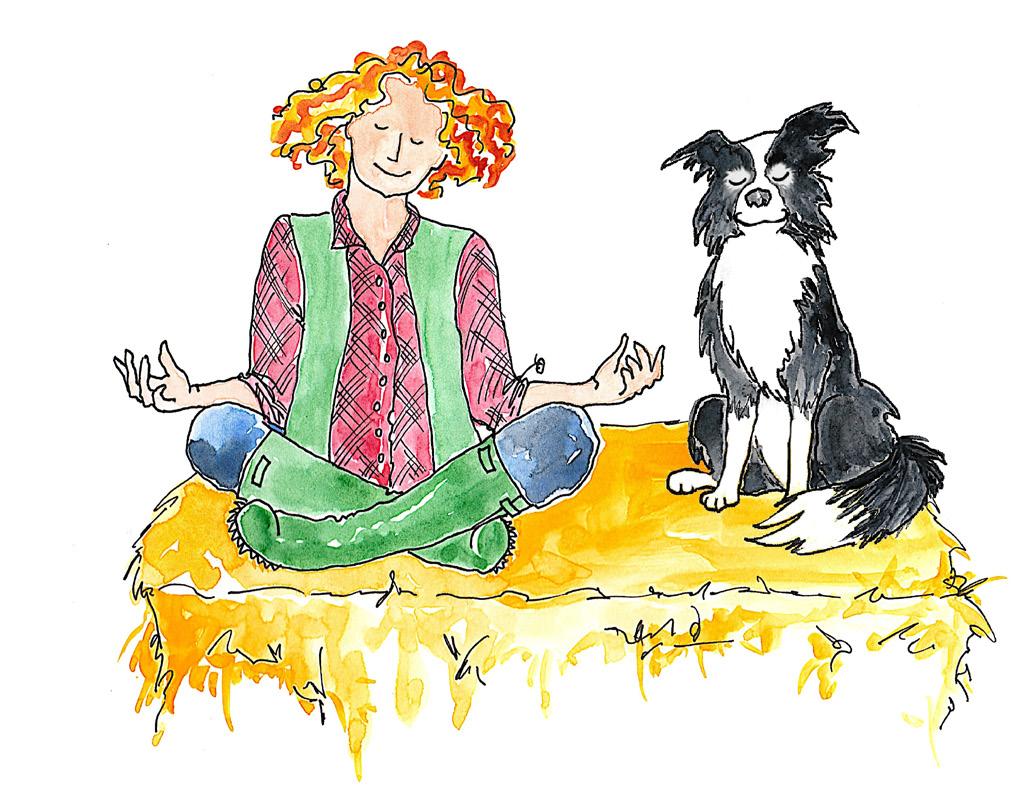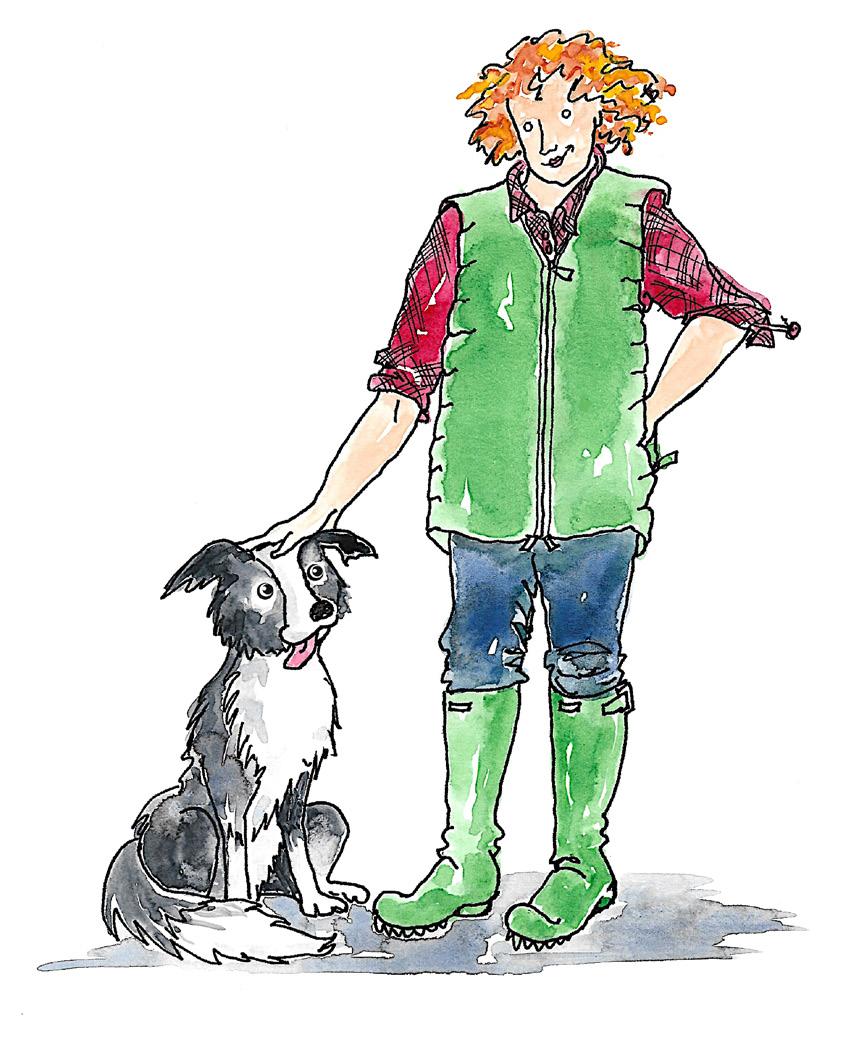
10 minute read
Heads First
Farming can be a 24 hour job. Sometimes it seems there aren’t enough hours in the day to do important things in life that matter to you, and these often get put on the back burner. Many things affect the way we think and feel – home life, relationships and work hassle are just a few of them. When we feel things are going well we’re ‘on top of the world’ and tasks seem easy. Throw in a financial crisis, extreme weather and a bucket-load of red tape and the day-to-day grind can wear us down. All farmers deal with issues in their own way, but we can’t ignore the fact that one in four will have a mental health problem.
HOW TO HELP
Do you know someone going through a crisis? Here are a few ways you can help them to cope: > Stay in their life – be there and keep in touch; Facebook and other social media is useful too
> If they want to talk about a problem, just listen > Ask what you can do to support them > Remember, they’re the same person you’ve known and cared about for years. No one expects you to be an expert, but patience and time to listen can mean a lot to someone facing a crisis. Leaving theem to speak freely and without judgement is a simple but effective way of getting the ball rolling. Life without stress is impossible, and a small amount of stress can be good for you, but prolonged stress can damage your health and even affect the people around you.

Most of us have experienced feelings such as being worried, being tense or feeling unable to cope. The good news is that there are things you can do to manage stress, at home and at work, with support from those around you.
STRESS SIGNALS We all have to deal with stress but people vary in how much it affects them. Get to know how it affects you. Watch out for common stress signals such as: > Eating more or less than normal > Mood swings > Not being able to concentrate > Feeling tense > Feeling useless > Feeling worried or nervous > Not sleeping well Some agencies forget how many things we juggle on the farm and in the office.
> Being tired or forgetful. Part of the problem is not recognising our own stress signals. Another part is expecting too much of ourselves.
Stress can be particularly bad for farmers because they are often working alone and may not get much chance to socialise. Stress can trigger anxiety, depression and physical symptoms such as: > Back pain > Indigestion > Irritable bowel syndrome > Psoriasis (scaly skin) > Migraine > Tension headaches. It’s hard to get away. We don’t employ anyone and there’s stock to tend daily.
HELP YOURSELF There are several things you can do to help yourself and improve how you feel physically and mentally: Talk it out Dealing with stress alone is never a good idea. Just talking about things that are making you stressed may help you see things differently. Talk to your friends or family Talking to even one other person can help. Talk with a health professional. You can speak to a doctor or practice nurse for advice and support, or see the list of useful contacts on the inside back cover.
Time out It can be tough on relationships when you are feeling very stressed which is why it is important to take time out. Quick fix: Getting yourself out of a stressful situation, even for a few moments, can give you the space you need to feel ready to tackle the problem.
Long term: Taking time out from your normal routine may help. If you have young children, try to organise a babysitter for an evening. Or take it in turns with your partner to have time to yourselves. As for work:
> Try to avoid doing excessively long hours (easier said than done at some times of year!) > Plan (and take!) a proper holiday in a quiet period of the year > Take breaks away from your work area each day. Chill out Getting enough sleep will relax your mind and help you cope with stress. Quick fix: Simple relaxation techniques like breathing deeply can be an effective way of helping you deal with stress. Long term: Plan relaxation time, even if it’s just a long bath or listening to music.
Try to get a good night’s sleep. Avoid sleeping tablets as they can be addictive and make things even worse. Leave it out Avoid smoking, junk food and alcohol! These won’t help your stress levels. Go easy on drinks that contain a lot of caffeine or sugar, as caffeine may make you feel anxious and sugar can cause mood swings. Quick fix: Drink plenty of water. This will help you concentrate and may stop you getting stress headaches. Long term: Improving your diet will help your body to deal with stress. It’s important to make time for proper meals. Talk during meals, as this is a time to relax as well as eat.
FIVE A DAY FOR MENTAL WELLBEING The NHS suggests five steps we can all take to improve our mental wellbeing:
Socialise Take time to develop family relationships. Close loving relationships with a spouse or life partner can go a long way to keeping us safe. Cultivate friendships off farm. Be Active Farmers are often on the move but also spend lot of time sitting in tractors, vehicles and at the computer. Exercise encourages the body to release endorphins which make us feel great and can relieve stress. Exercise also helps encourage sleep which is so important to helping us recover and feel well.
Keep Learning Farmers are skilled people and, with constant changes to the way we farm and the demands of the bureaucrats, always learning. But make a little time to learn a different skill or get involved in a discussion group. Give to others Farmers produce food and commodities which enhance the lives of others. Farming itself can bring a feel-good factor. But sometimes farmers are separated from the end result of their work. Taking time to be involved in activities which help other people directly can redress that balance and can make us feel really good about ourselves as well as helping others. Some farming support organisations recruit farmers to give a little of their time to make a difference to other people’s lives
Take Notice Many farmers work in beautiful settings. Taking time to slow down and enjoy the beauty around us and appreciate the privilege of being in the country can improve our mindfulness.

MINDFULNESS Mindfulness involves taking charge of your own state of mind, being more aware of the present moment rather than thinking about the past or future, which is where we often give a lot of our attention. It involves focussing for a few moments on one thing (usually your breathing). When the mind wanders you bring it gently back to the area of focus. A few minutes of each day promotes better quality sleep and reduces stress levels. Find out more from focussedfarmers.com, a mindfulness resource for the farming community set up in 2016.
SUICIDE Farming can be a wonderful profession. It’s not just an occupation, it’s a way of life. At times this makes it difficult for those farming to create a proper work-life balance. There is always one more job to do.
This can make for extreme tiredness and a build-up of damaging stress which can result in low mood and sometimes lead to depression. Because the family and the job are inextricably linked, this can have a major effect on family as well as working life. Farmers and their families, used to hard work, are often resilient and stoical. But at times pressures can reach boiling point. Mental and emotional well-being suffers and this can lead to feelings of low self-esteem and thoughts can turn to suicide.
Like everyone else, farmers experience emotional issues such as bereavement, breakdown in relationships, anxieties and depression, but farmers are at particular risk because they: > often work alone and for long hours > can be marginalised from the wider community in which we live > have easy access to the means to take their own life > find it difficult to talk about feelings > are under pressure from changing commodity prices, animal diseases, bureaucracy and changing circumstances > deal with life and death all the time in daily life. The first step towards recovery when feelings of suicide arise is to seek help from family, friend or support organisation. If you find it difficult to talk to someone you know, you could: > call your GP – ask for an emergency appointment > call 111 out of hours – they will help you find support > contact your mental health crisis team – if you have one. If you have or are about to seriously harmed yourself – for example, by taking a drug overdose – call 999 for an ambulance or go straight to A&E. If you’re having suicidal thoughts, talk to someone. An HSE awareness day helped me think about taking a moment to think first.
TIPS FOR COPING RIGHT NOW
> try not to think about the future – just focus on getting through today > stay away from drugs and alcohol > get yourself to a safe place, like a friend’s house > be around other people > do something you usually enjoy, such as spending time with a pet
LOOK OUT FOR OTHER FARMERS
Farming is a fairly close knit community and most of us meet from time to time with other farmers; we will have friends and family as well. Look out for symptoms of poor emotional and mental health in your friends: > Behaving out of character > Memory starts failing > Becoming increasingly negative or constantly anxious about something > Becoming irritable (or more irritable than normal!) > Complaining about not sleeping > Drinking to excess or developing nervous habits > Anything unusual that may suggest they’re starting to feel stressed.

Don’t be afraid to ask questions: Are you having thoughts about dying? Are you feeling suicidal? Do you feel that life is not worth living? Have you planned what you are going to do? Have you attempted to harm yourself in the past? However awkward it may feel, be as encouraging as you can so that they talk
about their feelings. Talking with them about feelings is always a route to helping them move forward. Talking about their feelings never makes the situation worse. Be prepared for the answer! Help your friend to seek help: perhaps from their GP (including the emergency doctor service if out of hours) or encourage them to phone a support organisation or with their permission, phone on their behalf. Go with them to an Accident and Emergency Department at a local hospital. Don’t promise to keep it a secret and, if you can, please don’t leave someone alone when there is significant risk of suicide.
SELF HARM Self-harm is when somebody intentionally damages or injures their body. It can be a way of dealing with difficult feelings, a way to regain a sense of being in control by changing emotional pain into physical pain.
Self-harm can include cutting or burning skin, punching or hitting oneself or poisoning one. All ages and both genders self-harm though young women are likely to be most at risk. Depression and anxiety can accompany self-harm and people who self-harm are at high risk of suicide.
Often people keep their self-harming a secret but discussing the feelings that lead to self-harm can help to address the behaviour. Your GP can help.









